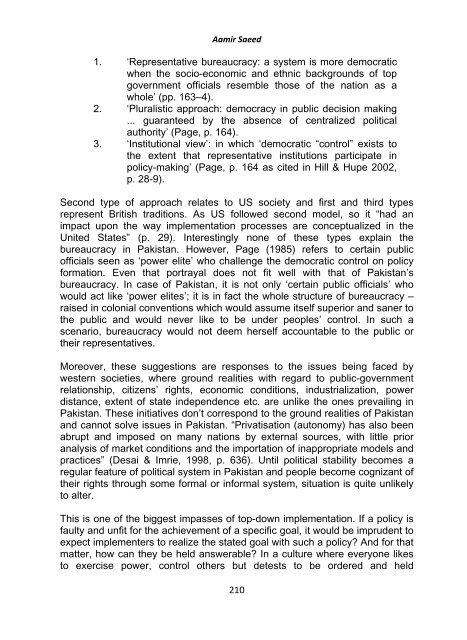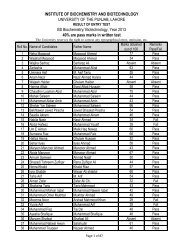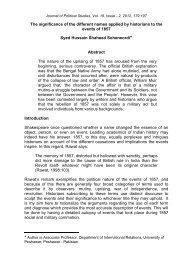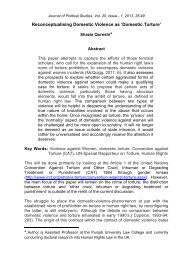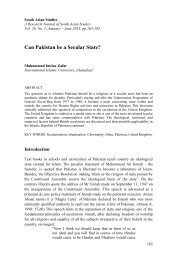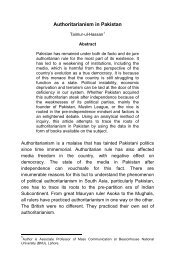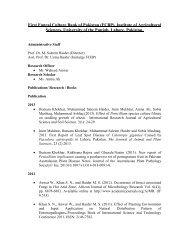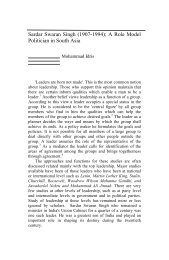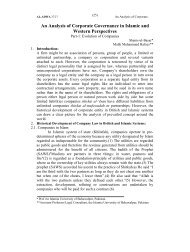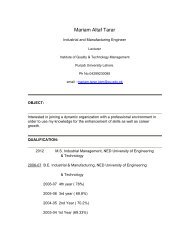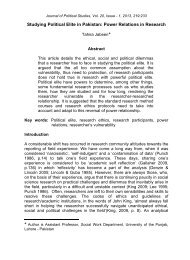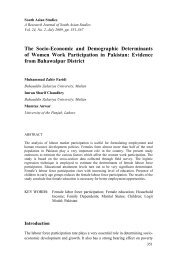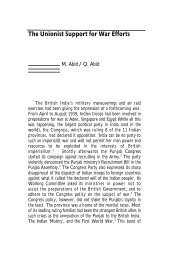Continuation of Colonial Policies by Aamir Saeed - University of the ...
Continuation of Colonial Policies by Aamir Saeed - University of the ...
Continuation of Colonial Policies by Aamir Saeed - University of the ...
Create successful ePaper yourself
Turn your PDF publications into a flip-book with our unique Google optimized e-Paper software.
<strong>Aamir</strong> <strong>Saeed</strong><br />
1. ‘Representative bureaucracy: a system is more democratic<br />
when <strong>the</strong> socio-economic and ethnic backgrounds <strong>of</strong> top<br />
government <strong>of</strong>ficials resemble those <strong>of</strong> <strong>the</strong> nation as a<br />
whole’ (pp. 163–4).<br />
2. ‘Pluralistic approach: democracy in public decision making<br />
... guaranteed <strong>by</strong> <strong>the</strong> absence <strong>of</strong> centralized political<br />
authority’ (Page, p. 164).<br />
3. ‘Institutional view’: in which ‘democratic “control” exists to<br />
<strong>the</strong> extent that representative institutions participate in<br />
policy-making’ (Page, p. 164 as cited in Hill & Hupe 2002,<br />
p. 28-9).<br />
Second type <strong>of</strong> approach relates to US society and first and third types<br />
represent British traditions. As US followed second model, so it “had an<br />
impact upon <strong>the</strong> way implementation processes are conceptualized in <strong>the</strong><br />
United States” (p. 29). Interestingly none <strong>of</strong> <strong>the</strong>se types explain <strong>the</strong><br />
bureaucracy in Pakistan. However, Page (1985) refers to certain public<br />
<strong>of</strong>ficials seen as ‘power elite’ who challenge <strong>the</strong> democratic control on policy<br />
formation. Even that portrayal does not fit well with that <strong>of</strong> Pakistan’s<br />
bureaucracy. In case <strong>of</strong> Pakistan, it is not only ‘certain public <strong>of</strong>ficials’ who<br />
would act like ‘power elites’; it is in fact <strong>the</strong> whole structure <strong>of</strong> bureaucracy –<br />
raised in colonial conventions which would assume itself superior and saner to<br />
<strong>the</strong> public and would never like to be under peoples’ control. In such a<br />
scenario, bureaucracy would not deem herself accountable to <strong>the</strong> public or<br />
<strong>the</strong>ir representatives.<br />
Moreover, <strong>the</strong>se suggestions are responses to <strong>the</strong> issues being faced <strong>by</strong><br />
western societies, where ground realities with regard to public-government<br />
relationship, citizens’ rights, economic conditions, industrialization, power<br />
distance, extent <strong>of</strong> state independence etc. are unlike <strong>the</strong> ones prevailing in<br />
Pakistan. These initiatives don’t correspond to <strong>the</strong> ground realities <strong>of</strong> Pakistan<br />
and cannot solve issues in Pakistan. “Privatisation (autonomy) has also been<br />
abrupt and imposed on many nations <strong>by</strong> external sources, with little prior<br />
analysis <strong>of</strong> market conditions and <strong>the</strong> importation <strong>of</strong> inappropriate models and<br />
practices” (Desai & Imrie, 1998, p. 636). Until political stability becomes a<br />
regular feature <strong>of</strong> political system in Pakistan and people become cognizant <strong>of</strong><br />
<strong>the</strong>ir rights through some formal or informal system, situation is quite unlikely<br />
to alter.<br />
This is one <strong>of</strong> <strong>the</strong> biggest impasses <strong>of</strong> top-down implementation. If a policy is<br />
faulty and unfit for <strong>the</strong> achievement <strong>of</strong> a specific goal, it would be imprudent to<br />
expect implementers to realize <strong>the</strong> stated goal with such a policy? And for that<br />
matter, how can <strong>the</strong>y be held answerable? In a culture where everyone likes<br />
to exercise power, control o<strong>the</strong>rs but detests to be ordered and held<br />
210


